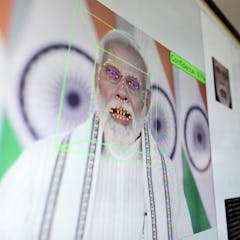
Articles on Artificial intelligence (AI)
Displaying 21 - 40 of 1388 articles

Cybercrime evolves quickly, so banks have to move at pace to keep their apps secure. But users have a role to play as well.

The prevailing human reaction to the idea of artificial intelligence has always been fear, revealed in the way film has portrayed our increasingly important relationship with AI over the years.

Our research shows it is not unusual for young people to harass and abuse their peers.

Our survey of more than 16,000 people in ten countries found Australia had the highest rate of deepfake porn victims.

We didn’t stop climbing mountains when chair lifts were invented. Similarly, there will always be something uniquely special and valuable about human music-making.

Google’s use of artificial intelligence to power its searches is an alarming development, especially considering how search engines are driven by financial interests.

Campaigns used deepfakes to connect with voters rather than deception, and AI also helped them break through language barriers.

Recruiters are now routinely using AI to automate the screening of CVs and interview videos. But human bias already exists in the AI data – and it can even be heightened by the algorithm.

An information scientist explains that while Google’s AI Overviews and other AI search tools may look enticing, you shouldn’t rely on them to fill all your search needs.

A new database of AI tools could help social scientists revolutionize the way they do their research, from scanning large datasets to aiding in literature reviews.

Online dating can be enhanced by using AI to create profiles, provide advice and identify matches.

AI has learned the ins and outs of proteins. Gene editing gives scientists control of life’s molecular machinery. Together they could lead to a revolution in biotechnology.

There have been plenty of shocking images, shareable graphics and heartbreaking stories of the conflict shared to social media. So why has this particular image gone viral?

Science has a need to verify results, but DeepMind’s protein prediction tool doesn’t work this way.

How much “customer interaction uncertainty” does your business deal with? The answer should guide your thinking about AI.

The AI train has left the station. Now, guardrails need to be hastily built to keep the technology from running the music industry off the tracks.

AIs that can see and hear have captured the public imagination. A machine learning expert explains why the sense of smell has lagged behind – and why that could change.

Deepfakes and disinformation are on the rise as the world faces the ‘biggest election year in history’. But AI doesn’t have to spell the end of democracy.

China and the US dominate AI and tech in terms of spending and business, but Europe has one very clear advantage.

Using AI to write search results is risky for Google, the internet, and the whole idea of ‘truth’
